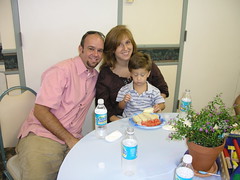 November is National Adoption Month. According to the US Department of Human Services Administration for Children and Families, the month is
November is National Adoption Month. According to the US Department of Human Services Administration for Children and Families, the month is
set aside each year to raise awareness about the adoption of children and youth from foster care. This year’s National Adoption Month initiative targets adoption professionals by focusing on ways to recruit and retain parents for the 107,000 children and youth in foster care waiting for adoptive families.
The issue of adoption is very important to me for two reasons:
- As parents, Jack and I adopted our son at age 11.
- As a passionate advocate for life, I want loving homes for children who are allowed to live through their birth rather than being killed in the womb.
We adopted our son more than three decades ago after years of being unable to have children of our own. Like most parents, we wanted a baby, but adoptable babies were scarce and still are. Millions of babies are murdered each year, while families desperate to have children remain childless. “Unwanted” babies may not be wanted by their birth parents, but they are wanted by parents who would love and care for them.
On the other hand, older children languish in foster care crying to be part of a family while parents looking for children never consider them because they aren’t newborns.
Older children can be extremely difficult because of their experiences during the early, formative years of their lives. Often, they have been removed from abusive or neglectful homes. Many have been bounced from foster home to foster home year after year. Educators may give them little attention. The children may have disabilities, physical and mental. They find it hard to love and accept love because they have been rejected so often in their young lives they have given up believing anyone will ever care for them. They may have been born with fetal alcohol syndrome or addiction to drugs their mothers took during pregnancy. Most likely, they will have low expectations about their own futures.
No, adopting an older child is not easy. It can be stressful and heartbreaking. I don’t talk about our experiences out of respect for the privacy of our son, who went through some difficult times but is doing well now.
Sometimes everything works out from the beginning, and the children adjust well. Other children end up in prison or on the streets in spite of their adoptive parents’ love and best efforts.
But what a blessing when a child who has been in all kinds of trouble through his teenage and early adult years turns his life around—gives up drugs and alcohol, gets a steady job, and marries. Without a loving family from whatever age he was adopted, that responsible adult might be in prison for life, homeless, or even dead from substance abuse or gang violence. Knowing your adult child is self-supporting and happy makes all the pain and heartache worthwhile.
There were few adoption and parenting resources available for us when we adopted our son. After the legal process was over, we were on our own, with no guidance on how to deal with the issues that had developed in the first eleven years of his life. I’m so glad to see so many resources available now to help adoptive parents understand what to expect and know how to best deal with problems that arise. If you want a child or children, consider adopting an older child who has been in foster care. Do your research and find the information you need about how to adopt and parenting after adoption.
Jack and I and our son would have all benefited from our having more information.
And from the other side of adoption, I encourage pregnant women who, for whatever reason, feel they can’t care for a baby to carry the baby to term and allow your baby life with a loving family through adoption. No, that’s not easy, either. I can’t imagine how difficult it would be to carry a baby for nine months, then hand the child over to someone else. But it’s the most loving thing a mother can do if she doesn’t want the baby or can’t care for the child. Your baby and the adoptive parents will be blessed, and you can know that you have been the source of great happiness for other people.
You may not be a prospective adoptive parent or a birth mother, but you can share adoption information with anyone you know in either category. You can thank birth mothers who gave babies up for adoption and adoptive parents who made a good home for a child in foster care. You can raise awareness about adoption and thereby contribute to bringing children and parents together.
